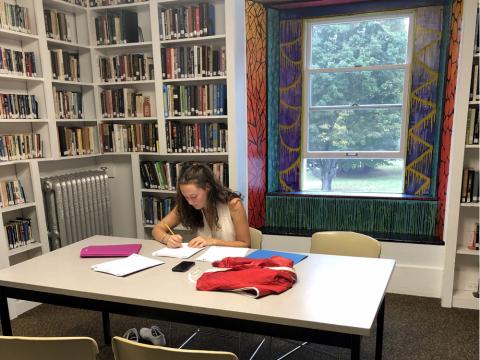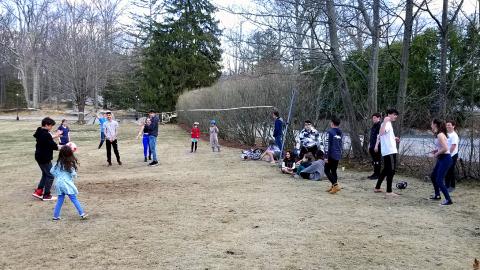As they decide whether or not to send their children here, or as they fret about their children while they are enrolled here, there are a whole series of concerns parents talk about and worry about that are related to what looks like the random way students pursue an education here. Often it stops those parents in their tracks and turns them away. I don’t think these concerns have substance, so I will list a few and tell you why.
(1) My kid is just average, not the kind of smart kid this school is for. She is not going to want to learn the “right” things. [Subtext: the right things are too boring for anyone to want.]
(2) My kid will not ask anyone for academic help. Can’t someone offer it to her?
(3) My child has big ambitions – an excellent college, and then grad school. How can he get there with no required work during his formative years?
(4) My kid isn’t self-motivated and there is no cure for that affliction.
(5) What if they play all day?
(6) What if s/he becomes addicted to “shudder” screens?
(7) Everyone else who sends their kids to a school like this is really a homeschooler very thinly disguised. What if we have to work full time and can’t enrich our children’s lives enough?
(8) The students there are probably eccentric. In fact, when you think about it, who are they? Is it a cult?
(9) The school has a judicial system. This may be okay for 12 and 14 year olds; no way can my 7 year old deal with such a system without being overcome by fear and losing all of her self-confidence.
I want to elaborate on each of these concerns, and see whether it is reasonable to hang on to them.
(1) My kid is just average, not the kind of smart kid this school is for. She is not going to want to learn the “right” things. [Subtext: the right things are too boring for anyone to want.]
I have been saying for 30 or 40 years that I am the “dumbest kid in school” (SVS, of course), because when children are free to pursue what they are interested in, they all become so very sharp-witted. They can solve problems, figure things out, and get help from all sorts of other people and places. Basically, they find out how to get what they need. These are the skills the modern world needs, and children here become proficient in all of them.
(2) My kid will not ask anyone for academic help. Can’t someone offer it to her?
Wait a minute. What is “academic” help? You mean, teaching them math? Well no we won’t. They have to ask. Offering help – even tutoring out of school – is a way for parents to say to their children: we are telling you out of one side of our mouths that we trust you to get your own education, to find what you need. And out of the other side of their mouths, the message is, “but we will take care of what we have deemed important.” SVS was never a real school for them.
(3) My child has big ambitions – an excellent college, and at least grad school. How can he get it with no required work during his formative years?
What is to stop them? No one has been stopped by an SVS education yet – only enhanced by their determination to achieve their goals. Any idea that one of our grads is less academically educated than the average 18 year old is just a joke. Our kids know how to operate in the world. They understand the scope of the world a little more clearly than most high school graduates. They can speak for themselves. They know what they want and why they want it. And they know hard work is what they need to do to accomplish their aims. What is sometimes harder – and this is when parental doubt enters – is to figure out how a child’s daily activities, which often look oddly chosen to their parents, add up to that education; how they fulfill the child’s needs. Often parents see it in retrospect (better late than never)!
(4) My kid isn’t self-motivated and there is no cure for that affliction.
Not self-motivated? How do they get going at all in the morning? Who puts the food in their mouths for them? Who taught them how to play video games? What happens when you tell them to “Stop, that’s it for today!” We all are born self-motivated or we would not have made it at all. Even a coddled human infant figures out the codes necessary to get what it wants.
(5) What if they play all day?
Maybe this one should have gone first. Because secretly that is at the heart of most of the anxieties. What if they do play all day? Then they will be able to develop their creativity quite fully; the evidence is very much on our side! They will never complain of boredom. But more than that, what is play? It is using your time in ways that are appealing to you without constantly looking at the end result. It is allowing your imagination free rein, freedom indeed, even if often what you “play” has rules. It is enjoying your companions to the fullest. One might say it is living to the fullest.
My kids played all day. All of us do, often, with dead seriousness! I have always been jealous of that freedom, and my life, like those of other SVS staff, is devoted to ensuring that freedom to as many kids as possible, and showing the world that people who play become people who know best how to pursue a full and meaningful life. Can we hope for more for our children? Their maturity as graduates often dazzles. Their motivation – extraordinary.
You can see the minute you look at free children that play is their “work”, that is to say, seriously pursued; and conversely, good work has the excitement of play. Play is also how you best learn. Article after article appearing in the popular press talks about the benefits of recess, in traditional schools, of allowing children free time together, of not filling their evenings with homework, of encouraging play. Play happens when people are free. Play is all day every day at SVS. That is what makes the school exuberant – not quiet, also not wild, always within the control of the players. They are thinking players – and incidentally, the outdoors is theirs!
(6) What if s/he becomes addicted to “shudder” screens?
Ah, screens. Ah, books! Are they so different? Why yes, screens are much more flexible and much more variable than books are, in general. But if you have your head in a book all the time, no one will criticize you. If you are reading science, playing a popular board game, reading science fiction, chatting with your friends, it is met with approval. Unless it is on those screens, and then it bugs almost everyone over 30. It doesn’t bug us here, but that is because we know that every hour, day, minute spent chatting with others is indeed part of what forms your knowledge base, your education. It is so much easier to keep that conversation productive when you have a screen in your pocket to check your facts!
I learned about screens from my grandchildren. I watched them through the beginning years of computer games, and then on-line computer games. A game, or an activity, is fun, challenging, and exciting. Until you master it completely. Then it isn’t. What you do at that point is give it up and play another that offers more challenge. Do I care that some games involve violence? Not a bit. Try it out. You don’t have any trouble telling a screen from a battlefield!
Lest you think I am not knowledgeable about the commercial aspects of games – I have heard, “Oh, I am done with that game and have all this virtual stuff. Hmm. Maybe I should be more careful next time with what I purchase!” Is that not a good thing to learn?
(7) Everyone else who sends their kids to a school like this is really a homeschooler very thinly disguised. What if we have to work full time and can’t enrich our children’s lives enough?
This is a hard criticism because it assumes so much less about the atmosphere at school than is true, and it is hard sometimes to explain to parents, especially if they are worried about their kids not becoming the most educated that they can.
Many parents have a certain amount of guilt about either their own busy lives or their laissez-faire attitude towards home life. Somehow they think that most other parents are busy, like homeschoolers are supposed to be, enriching their children’s lives non-stop in their version of the ideal world, which has books (clearly there are none here at SVS); documentaries (no one can find such things in a school like this either – they probably only use YouTube for game reviews); and last but not least, endless glorious family field trips. That is another thing most parents are pretty sure they would do if they had time. That includes, of course, the trips the kids want and those they don’t, because “it is for their own good”. At SVS, field trips are initiated by students. They only go on the ones that sound like fun. And they remember them their whole lives. Even last month I was with some kids who remembered a field trip they had taken to New York – and how Joanie got yelled at for “lecturing” – explaining things to a small group of rapt students – by the guards at MOMA. It was almost forty years ago. The trips, alumni say, are “magical”. Everything about every trip – the atmosphere, the place, and most of all, the people spread the glue through the community.
But for those parents – surely the majority – who have two career families, they sometimes feel they can’t enrich enough. The world is quite real. Parents work – in most families both of them – they have to drive themselves, and their kids, around and, truth be told, it is the lucky child that is able to do something outside of school that they beg for.
(8) The students there are probably eccentric. In fact, when you think about it hard enough, who are they anyway? Is it a cult?
That is really a very sad criticism. A school full of children that are happy resembles a cult to some. These kids are not mindlessly pretending at joy! What you see here is actually not what holds up in the definition of cults! The strangest rule or idea we have is that you can only eat popcorn outside! The strangest customs: kindness and respect. And yet whenever I try to paint a picture of the atmosphere here to a doubting parent, it sounds way too good to be true. It sounds like the school has been sprinkled with fairy dust. It is quite hard to understand that we have built a very strong culture here, through fifty years of effort and cooperation between children and even adults, and it is just that, a culture built on mutual caring and trust. Nothing more.
(9) The school has a judicial system run by due process. This may be okay for 12 and 14 year olds; no way can my 7 year old deal with such a system without being overcome by fear and losing all of her self-confidence. Parents worry that the “guilty” plea will make their child feel like a convict drudging through hard sentences, after a judge and jury have firmly and carefully told that child what was “wrong” with them.
Many graduates, probably most, on the other hand, and also the parents of present and former students, think the best thing about the school is the judicial system. And even though many people who study our clearly defined laws worry that it is “harsh”, it is no such thing. The Judicial Committee, which accepts written complaints, talks to witnesses and complainants, figures out what happened, writes a report on their findings, and then decides whether to charge a person with any rules that were broken. This system is like the best idea of what a family can never be: utterly impartial, kind, cognizant of those who are not yet “in the know” about the system, careful with justice, and extraordinarily merciful when it comes to sentencing. So, imagine walking into a room of kids of all ages, seven of which, along with one staff member, are on the Committee, and beginning to tell your story. Suddenly, everyone is listening to you carefully. They want to know what happened, what you think, and how you reacted. They want to reassure you that you can make complaints about anything that you feel violates a school rule, and it will always be taken gently and seriously. And suddenly, be you 5 or 15, you realize this is what empowerment is all about – knowing every person is listened to without pre-judgment. The Judicial System is far from “crime and punishment” – and is the best learning tool we have. It is, first, last and always, fair.
Probably it is a great school, particularly for your child!




